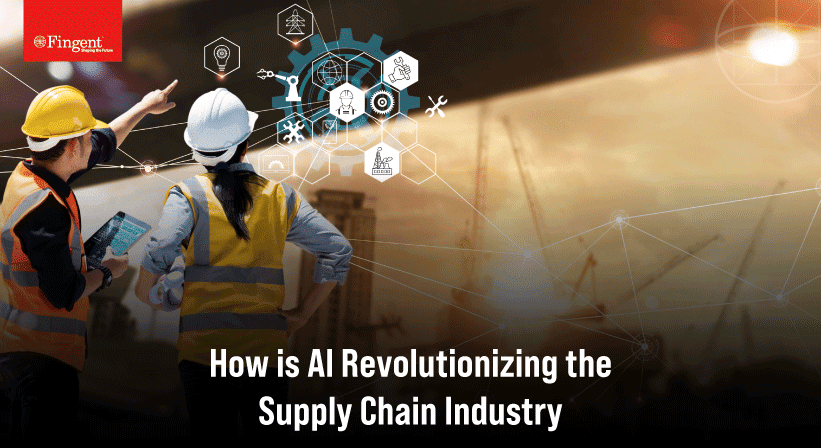The Role of AI in Supply Chain and Logistics
Maximize productivity and minimize uncertainty! That’s what Artificial Intelligence promises the Supply Chain and Logistics industry. The fragility of the supply chain is not unknown to industries. Delays, stoppages, and complexities in the supply chain are a few limitations businesses are striving to overcome. Operational efficiency, intelligent decision-making, and continuous improvement must be maximized. Thankfully, AI helps do just that. This blog will take you through the top benefits businesses can derive with AI in Supply Chain!
Why Is Now the Best Time for Supply Chain and Logistic Firms to Adopt AI?
The global trade scene and geopolitical risks have not been kind to the supply chain. A 2023 Annual Supply Chain Report revealed that events around the world continue to have a detrimental impact on it. These include political upheavals, climate-related events, supply chain legislation, and more. Internally, there are issues to deal with as well. A lack of governance and data management, labor strikes, and communication hurdles have proved challenging.
Not everything is bad news, though. These harsh conditions have built resilience and determination in supply chain and logistics organizations worldwide. A 2024 KPMG study of supply chain trends says: “Enabled with a raft of technology developments, a new paradigm is emerging in supply chain management. One where organizations can respond quicker to day-to-day requests, proactively address problem-solving, and reduce errors and inefficiencies.”
Businesses are becoming wise to the situation and are reaping benefits. According to a McKinsey report, leveraging AI has helped businesses enhance logistics costs by 15%.
AI helps companies gain a unique competitive advantage in supply chain management and logistics operations. It can install advanced algorithms and large-scale data analytics as an emerging technology. This simplifies supply chain workflows and boosts decision-making processes. Some other perks of leveraging AI-powered technologies are accurate forecasting, inventory management, optimization of transportation functions, improvement of flexibility and agility, and enhancement of customer satisfaction. These are all the ingredients you need to get your supply chain processes back on track.
The time to build resilience with the help of technology is NOW!
Explore More Business Opportunities With Artificial Intelligence
What Are the Top Benefits of Using AI in the Supply Chain?
AI can bring operational efficiency, on-time delivery, accurate predictions, risk management, and more to the supply chain and logistics management. Here are the top benefits industries can reap by deploying AI for logistics.
1. Reduced Cost
AI has the power to automate tasks. This gives a power boost to the human workforce. . It frees them up for higher-value activities and takes over the burden of mundane labor. This optimization of labor practices will reduce labor costs while increasing efficiency. AI-powered forecasting can help maintain optimal inventory levels, decreasing any risk of stock-outs and loss of sales. This directly contributes towards cost savings
2. On-Time Delivery
AI systems can process large amounts of data in real time. It can recognize patterns, enhance inventory levels, and accurately predict demand. This predictive ability ensures on-time delivery, thus enhancing operational efficiency. Generative AI can use algorithms to analyze transportation routes and optimize logistics scheduling. This will, in turn, improve delivery times and reduce fuel consumption and transportation costs. Another major benefit is real-time tracking and updates on orders. This provides transparency with customers that will increase their confidence and satisfaction.
3. Accurate Management And Planning
Predicting future demands is vital for effective stock and product management. AI algorithms can forecast product demand for specific seasons of the year. This enables companies to make well-informed decisions about managing inventory. As for logistics firms, AI can enhance supply planning. By analyzing factors such as production schedules, sales data, and costs. This analysis helps businesses to plan warehouse functions. This includes managing stock levels and surplus inventory. Thus reducing costs and providing control over expenses. A survey by McKinsey showed a reduced cost expense of 15% in logistics management. Early adopters of AI-powered supply chain management saw this change.
4. Risk Management
Leveraging AI for supply chain management and logistic operations can reduce risk. AI bots can be used effectively in this regard. They do this with the application of advanced analytics and scenario modeling. This enables businesses to create complex contingency plans and adapt risk mitigation strategies. Generative AI measures the impact of any chain of damage. This will, in turn, allow companies to respond and use effective mitigation strategies. AI-powered supply chain monitoring tools work together to identify any risks. Early detection alarms, for example, enable timely intervention and reduce impact on performance.
AI Use Cases In Logistics
Artificial Intelligence controls data and uses machine learning to optimize the flow of goods. With algorithms to identify patterns, relationships, and trends, AI enables accurate predictions and recommendations. Here are some use cases to show how this can help businesses:
1. Bullwhip Effect Prevention
A small change in demand can create catastrophic ripples across the supply chain. Effective demand forecasting helps mitigate this bullwhip effect. Demand forecasting utilizes predictive analytics to estimate customer demand forecasts. It does this by analyzing historical data in real-time. With this method, businesses can improve their decision-making processes and workforce planning. Thus, AI-powered demand forecasting can reduce error rates, leading to improved accuracy in demand prediction. Manufacturers can manage every little detail, like the number of vehicles dispatched, and thus reduce operational costs.
According to a Gartner study, demand forecasting is the most used ML application in supply chain planning. The study also highlighted that 45% of businesses have already implemented this technology, and 43% plan to use it within the next two years.
2. Automation Warehousing
Reports estimate the warehouse robotics market will reach USD 10.5 billion by 2028, accompanied by a CAGR of 11.4% during the forecasting period. The need for operational quality is the fuelling force that drives this growth. Amazon is a great example of this change. The giant retail company Amazon has close to 200,000 robots functioning in its warehouses. These robots help employees pick, sort, transport, and stow packages.
Computer vision technology allows businesses to identify damaged goods. This ensures quality control in warehouse operations. Logistics managers can also regulate the size and type of damage. This will help them take appropriate action. Predictive maintenance is another technology that is very beneficial to a company warehouse. It can predict machine failures in the factory. It does this by processing real-time data gathered from the IoT sensors.
3. Back Office Management
Every company has a back office that handles the brunt of the workflow. It manages largely repetitive tasks, including bill of lading, invoice maintenance, document processing, and customer services. AI can transform these processes into simpler tasks.
An example is the invoice of rate sheet documents. They manage communication within the workspace. With the help of AI, this process can be automated and made efficient. Accurate data input, error reconciliation, and document processing make this possible. Hyperautomation can help here as well. It combines Artificial Intelligence with robotic process automation and process mining. Together, they make the automation process seamless.
Customer service chatbots analyze customer experience with chatbot analytics metrics. This helps them understand the customer’s needs and respond accordingly, leading to higher customer satisfaction rates.
4. Sales & Marketing
Predictive lead scoring is a subfield of AI and is invaluable to the sales function. It uses machine learning to calculate a score for open leads based on historical data. Lead scoring will ensure that sales reps can focus on the right prospects for the company. This AI-powered tool can assign appropriate scores to leads based on their profile, behavior, and interests. These algorithms can process data. Thus, they can predict which leads will convert into paying customers.
AI can also analyze sales and marketing. With the help of AI-powered tools, logistics service providers can process customer behaviors. This helps them predict the customer’s next move. They can also track fluctuations in the market, enabling logistics service providers to be alert and make data-driven decisions.
Reshape Customer Experiences with AI & ML
What Are the Top Trends in AI for Supply Chain?
IoT, Hyper-Personalization, Robotics, and Natural Language Processing are some of the top trends businesses can expect to see and implement going forward. Here are the details:
1. Better Integration With The Internet Of Things (IoT)
Internet of Things (IoT) devices allow for real-time tracking of products in a supply chain. When combined with advanced AI technology, they can perform a wide range of tasks. These tasks include optimization of routes, reducing delays, and enhancing supply chain management.
New technologies, such as digital twins, will allow companies to develop a digital model of the product. This can help companies create a virtual representation of their supply chain model. Drones are also equipped with IoT sensors to test deliveries. Studies estimate that around 70% of urban deliveries are drone-based package delivery networks.
2. Autonomous Supply Chain Systems And Robotics
A 2023 Gartner study predicts that 75% of companies will install cyber-physical automation in their warehouse operations by 2027. The use of robotics and AI-driven systems will streamline the warehouse processes, thus reducing reliance on labor and resources.
Some companies, like Amazon, have already installed autonomous mobile robots (AMRs). In the future, many more companies will follow suit, and we can expect to see AMR technology bloom. These autonomous robots will have systems working 24/7, thus implementing a higher level of quality and productivity.
3. AI-Driven Hyper-Personalization Of Service
The increased priority to customer service is a trend seen throughout innumerable industries. AI can help with this by analyzing customer data and preferences. Businesses can better curate their services to personalized needs. With the introduction of AI, hyper-personalization will grow further. It will encourage manufacturing managers to leverage Machine learning. This will automate manufacturing adjustments that will, in turn, improve customer experience. According to reports, AI-driven forecasting can improve supply chain resilience. It has the potential to reduce stockouts by 50%.
4. Adoption Of Advanced AI Technologies (NLP, Annss)
More and more companies will recognize the potential of high-level AI systems. They will rely on Machine Learning, deep learning, and natural language processing. We will see a rise in data analytics quality and, by extension, better decision-making.
Machine Language has an unparalleled ability to process large amounts of data to recognize trends. It will improve accuracy when it intercedes with forecasting inventory needs.
Artificial Neural Networks (ANNSs) are subfields of AI that use deep learning and ML. They detect anomalies and predictive maintenance needs. NPL will also play a big role in enhancing workflow. Thus improving communication between team members, employees, and machines.
How Can Fingent Help Future-Proof Your Supply Chain And Logistics Firms With AI?
At Fingent, we recognize and understand AI’s transformative power. We expertly maneuver its ability to optimize your supply chain and offer curated custom logistics software development services. Experts at Fingent understand what is needed to implement AI solutions effectively for your business. They specialize in AI technologies like Machine Learning, Natural Language Processing, and Robotic Process Automation. We can thus help you tap into the latest advancements in technology.
When you work with Fingent, you get a dedicated team of experienced professionals who can guide you with expertise in logistics management and advanced AI services. Connect with us today to develop customized solutions for streamlined operations, seamless processes, and competitive advantage.
Stay up to date on what's new

Recommended Posts

25 Jan 2024 Logistics B2B
The Manifold Benefits of Custom Fleet Management Software in Supply Chain
Cost, Compliance, Efficiency, and Manpower – These are the pillars on which a fleet management business stands. A compromise on any of these can mean the whole business topples with……

15 Jul 2023 B2B
Exploring the Power of AI In Supply Chain
Artificial Intelligence (AI) evolved from a concept of science fiction to a transformative force that permeates our daily lives. From autonomous vehicles to voice assistants, AI has already made significant……
Featured Blogs
Stay up to date on
what's new























































